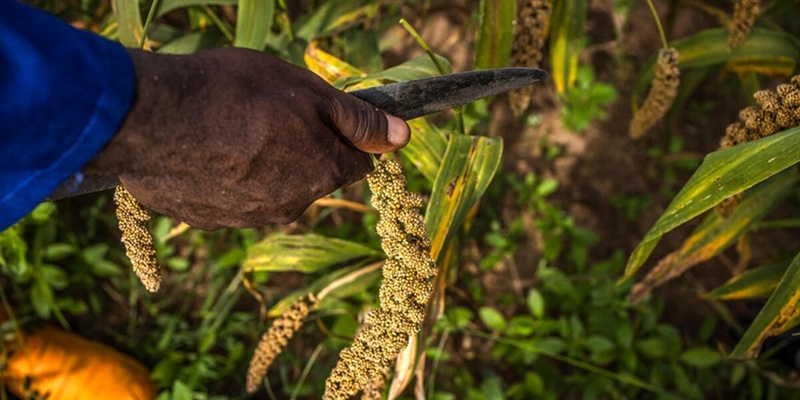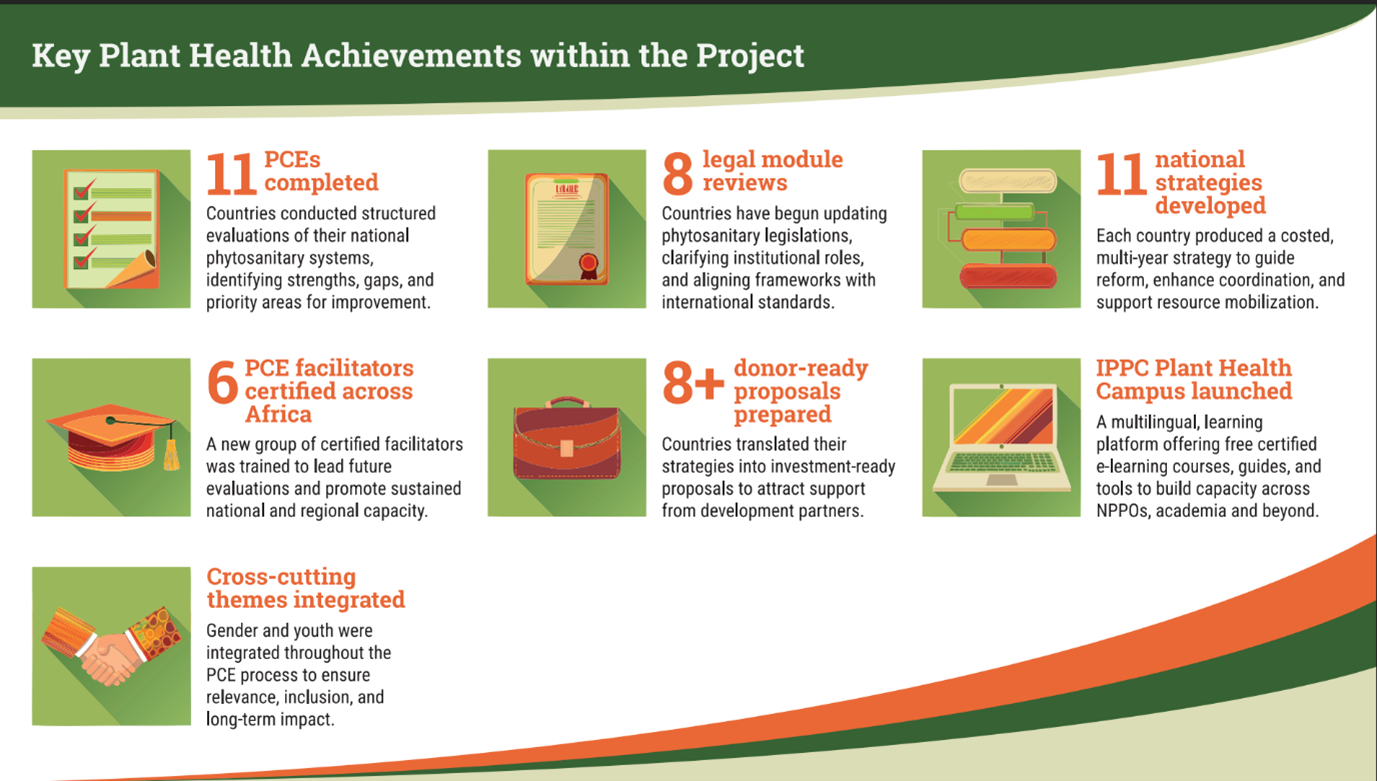Proyecto emblemático de la CIPF encamina a los países africanos hacia un comercio más sólido.
Posted on Vie, 18 Jul 2025, 07:14

© FAO/Stuart Tibaweswa
Roma, 17 de julio de 2025. Los países africanos están a punto de sacar provecho de un proyecto histórico sobre comercio y cuarentena, que ha proporcionado a los países conocimientos y capacidades fundamentales para protegerse de las plagas de las plantas agrícolas y aprovechar los vastos recursos naturales del continente.
El proyecto de 3 años y 7 millones de USD Strengthening Food Control and Phytosanitary Capacities and Governance (Fortalecimiento de las capacidades y la gobernanza en materia de control alimentario y fitosanitario) concluyó el mes pasado tras ayudar a 11 países africanos a identificar los retos de sus sistemas de importación y exportación, implementar mejoras y, en última instancia, promover un comercio internacional seguro.
En el marco de este proyecto financiado por la Unión Europea, los países de la región del Mercado Común para África Oriental y Meridional (COMESA) dedicaron meses a realizar rigurosas evaluaciones de la capacidad fitosanitaria (ECF) , guiadas por la Secretaría de la Convención Internacional de Protección Fitosanitaria (CIPF), que permitieron identificar las lagunas de sus sistemas de bioseguridad.
Sarah Brunel, jefa de la Unidad de Facilitación e Implementación de la Secretaría de la CIPF, declaró que, gracias a la eficaz ejecución del proyecto, otros donantes y países comprenden ahora mejor la importancia de las ECF para el comercio regional y mundial. «El proyecto complementa otra iniciativa de la CIPF, el Programa Fitosanitario de África, que forma al personal de campo en el uso de herramientas digitales para la vigilancia de plagas», afirmó
«Este proyecto ha demostrado lo que es posible cuando los países asumen como propias sus prioridades fitosanitarias y reciben el apoyo de las herramientas adecuadas», afirmó Brunel. «Desde las estrategias nacionales hasta los bienes mundiales, los resultados tendrán efectos dominó en los años venideros», añadió.

Estudios sobre la aplicación de la ECF
Entre 2022 y 2025, Djibouti, Egipto, Eswatini, Kenya, Malawi, Mauricio, Rwanda, Seychelles, Uganda, Zambia y Zimbabwe trabajaron con facilitadores de la CIPF para completar sus ECF. Según un estudio de análisis de brechas de las ECF, los países realizaron sobre todo evaluaciones de sus actividades operativas fitosanitarias básicas, como el diagnóstico, la vigilancia y el análisis de riesgos. Sin embargo, las evaluaciones de la gobernanza, en particular de la participación de las partes interesadas y de los factores medioambientales que afectan a las operaciones de las ONPF, fueron de las menos seleccionadas. Esto puso de manifiesto una laguna en la planificación estratégica a largo plazo y en la coordinación de políticas.
Todos los países pasaron a desarrollar estrategias fitosanitarias nacionales con planes presupuestados, calendarios y responsabilidades institucionales definidas. En varios casos, estas estrategias ya han empezado a dar forma a la reforma legal y a influir en los marcos nacionales de planificación e inversión.
Uganda, por ejemplo, obtuvo 8 millones de euros de la UE para mejorar las inspecciones, el diagnóstico y la vigilancia agrícolas. Como signataria de la CIPF, Como signataria de la CIPF, Uganda se está posicionando como un importante socio comercial para los países ávidos de productos tropicales.
«Uganda tiene un enorme potencial para el comercio de plantas y productos vegetales debido a su posición en la línea ecuatorial, abundantes recursos, diversos productos agrícolas, creciente infraestructura comercial, agricultura orgánica y oportunidades de inversión en agricultura comercial, adición de valor y agroprocesamiento», explica Musimenta Herbert, Inspector Agrícola Principal del Ministerio de Agricultura, Industria Animal y Pesca de Uganda.
Uganda también está utilizando la solución ePhyto de la CIPF como un medio electrónico para la emisión de certificados fitosanitarios requeridos para el comercio internacional de mercancías, en sustitución de los procesos en papel obsoletos que ralentizan tanto las solicitudes como la entrega de dichos certificados.
El proyecto mejoró la iniciativa ePhyto de la CIPF para África, cuyo objetivo es conectar sin fisuras al menos al 70% de todos los países africanos al centro ePhyto en un plazo de tres años. En la actualidad, solo 13 de los 54 países africanos han integrado plenamente ePhyto en sus procesos sanitarios y fitosanitarios relacionados con el comercio.
Para garantizar la sostenibilidad, el proyecto COMESA invirtió en el desarrollo de capacidades a largo plazo, además de animar a los países a adoptar ePhyto. Además, se formó y certificó a seis nuevos facilitadores de la ECF en toda África, con lo que se amplió el grupo regional de expertos y se apoyaron procesos de evaluación más impulsados localmente.
Otro estudio, realizado conjuntamente por la Unión Africana y la Secretaría de la CIPF, que examinó el impacto del desarrollo de la capacidad fitosanitaria en África, concluyó que los enfoques programáticos a largo plazo son esenciales para crear sistemas fitosanitarios resistentes capaces de apoyar la agricultura sostenible, el comercio inclusivo y la transformación económica en todo el continente.
El proyecto COMSEA también financió el innovado Campus fitosanitario de la CIPF, creado en colaboración con la Academia de aprendizaje electrónico de la FAO. Esta plataforma multilingüe y de libre acceso ofrece cursos certificados gratuitos de aprendizaje electrónico, guías técnicas y recursos prácticos para apoyar a las organizaciones de protección fitosanitaria, las universidades y los profesionales y entusiastas de la sanidad vegetal de todo el mundo.
Las organizaciones nacionales de protección fitosanitaria (ONPF) y las instituciones académicas ya están explorando el campus para su uso en la enseñanza y la investigación, ya que la herramienta ayuda a colmar las lagunas mundiales en materia de conocimientos fitosanitarios y a crear la próxima generación de profesionales de la sanidad vegetal.
A lo largo del proyecto también se tuvieron en cuenta cuestiones transversales como la igualdad de género y la inclusión de los jóvenes, así como la sostenibilidad medioambiental, lo que contribuyó a garantizar que el proyecto no sólo fuera sólido desde el punto de vista técnico, sino también sensible desde el punto de vista social. Para entender cómo funciona en la práctica el proceso de la ECF y escuchar directamente a los países participantes, vea el vídeo de la ECF de la CIPF.
Comparta
**#sanidadvegetal #CIPF #África #comercioafricano #comercio #capacidadfitosanitaria #ePhyto #ProgramaFitosanitarioÁfrica

